行为动词一般现在时
一般现在时含行为动词
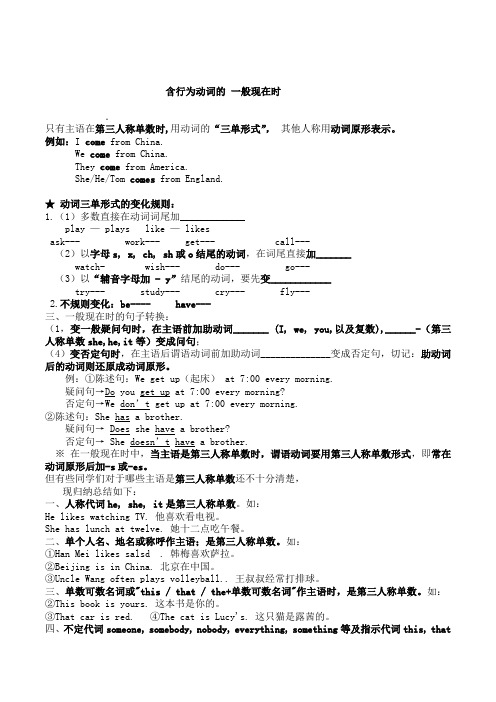
含行为动词的一般现在时.只有主语在第三人称单数时,用动词的“三单形式”,其他人称用动词原形表示。
例如:I come from China.We come from China.They come from America.She/He/Tom comes from England.★动词三单形式的变化规则:1.(1)多数直接在动词词尾加_____________play — plays like — likesask--- work--- get--- call---(2)以字母s, x, ch, sh或o结尾的动词,在词尾直接加_______watch- wish--- do--- go---(3)以“辅音字母加 - y”结尾的动词,要先变____________try--- study--- cry--- fly---2.不规则变化:be---- have---三、一般现在时的句子转换:(1,变一般疑问句时,在主语前加助动词_______ (I, we, you,以及复数),______-(第三人称单数she,he,it等)变成问句;(4)变否定句时,在主语后谓语动词前加助动词______________变成否定句,切记:助动词后的动词则还原成动词原形。
例:①陈述句:We get up(起床) at 7:00 every morning.疑问句→Do you get up at 7:00 every morning?否定句→We don’t get up at 7:00 every morning.②陈述句:She has a brother.疑问句→ Does she have a brother?否定句→ She doesn’t have a brother.※在一般现在时中,当主语是第三人称单数时,谓语动词要用第三人称单数形式,即常在动词原形后加-s或-es。
但有些同学们对于哪些主语是第三人称单数还不十分清楚,现归纳总结如下:一、人称代词he, she, it是第三人称单数。
初中英语行为动词一般现在时的整理
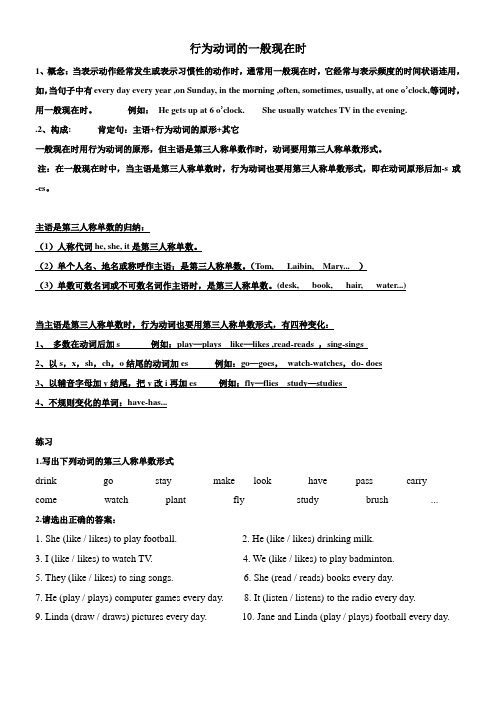
行为动词的一般现在时1、概念:当表示动作经常发生或表示习惯性的动作时,通常用一般现在时,它经常与表示频度的时间状语连用,如,当句子中有every day every year ,on Sunday, in the morning ,often, sometimes, usually, at one o’clock,等词时,用一般现在时。
例如:He gets up at 6 o’clock. She usually watches TV in the evening..2、构成: 肯定句:主语+行为动词的原形+其它一般现在时用行为动词的原形,但主语是第三人称单数作时,动词要用第三人称单数形式。
注:在一般现在时中,当主语是第三人称单数时,行为动词也要用第三人称单数形式,即在动词原形后加-s或-es。
主语是第三人称单数的归纳:(1)人称代词he, she, it是第三人称单数。
(2)单个人名、地名或称呼作主语;是第三人称单数。
(Tom, Laibin, Mary... )(3)单数可数名词或不可数名词作主语时,是第三人称单数。
(desk, book, hair, water...)当主语是第三人称单数时,行为动词也要用第三人称单数形式,有四种变化:1、多数在动词后加s例如:play—plays like—likes ,read-reads ,sing-sings2、以s,x,sh,ch,o结尾的动词加es例如:go—goes,watch-watches,do- does3、以辅音字母加y结尾,把y改i再加es例如:fly—flies study—studies4、不规则变化的单词:have-has...练习1.写出下列动词的第三人称单数形式drink ________ go _______ stay _______ make ___look ______ have_____ pass______ carry ______ come_________ watch_______ plant_________ fly __________study_________ brush________ ...2.请选出正确的答案:1. She (like / likes) to play football.2. He (like / likes) drinking milk.3. I (like / likes) to watch TV.4. We (like / likes) to play badminton.5. They (like / likes) to sing songs.6. She (read / reads) books every day.7. He (play / plays) computer games every day. 8. It (listen / listens) to the radio every day.9. Linda (draw / draws) pictures every day. 10. Jane and Linda (play / plays) football every day.行为动词的一般现在时1.肯定句:主语+行为动词的原形+其它当主语是第三人称单数时,行为动词也要用第三人称单数形式,2.否定句:主语+don’t( doesn’t ) +动词原形+其它如:①I like bread. 否定句:I don’t like bread. ②We eat fish . 否定句:We don’t eat fish. 当主语为第三人称单数时,要用doesn’t构成否定句。
一般现在时

练习
翻译句子: 1.我们周日去公园。
We go to the park on Sunday.
2.我不是很喜欢英语。
3.他们每年都来中国。
I don't like English very much.
4。他们不是每年都来中国。
They come to China every year.
They don't come to China every year.
• 4.Tom ___his homework at home. A don't do B doesn't C doesn't do D don't 5. My father ____computer games. A sometimes play B plays sometimes C sometime play D sometimes plays 6. His grandpa likes the film and often___to the cinema. A go B goes C is going D to go 7. Do you ___have parties? -Yes.Every Saturday evening. A does B never C often D do
一般现在时的特殊疑问句(3) • How do I write my homework on the y name? • When does he use a computer? • 构成:特殊疑问词+一般疑问句语序
练习
1.你每年寄多少张明信片? How many postcards do you send every year?
• 三.单数第三人称行为动词一般现在时 的疑问形式是在句首加助动词does, 后面的谓语动词要用原形。 • 比较: • 肯定句:He gets up very early. • 疑问句:Does he get up very early? • 答语 :Yes,he does. • NO,he doesn't.
行为动词(一般现在时)讲解
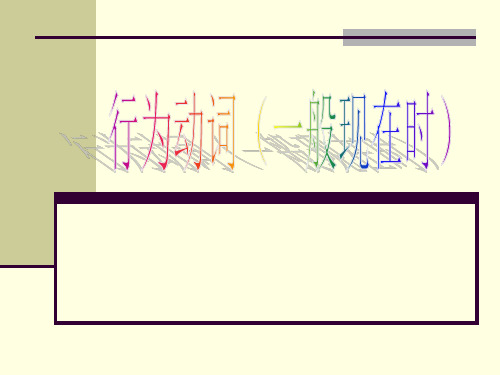
行为动词指除动词be和have以外,一切可以单独作 谓语的动词。动词be和动词have一般表示状态,而 行为动词大都用来表示动作,如work,study,swim 等。
二、行为动词一般现在时的构成
行为动词一般现在时须用动词原形表示,但当主 语是第三人称单数时,词尾须加-s或-es,其构成 方法与名词复数构成方法相同,现以动词work为 例:
2)与every一起用的状语词组:
day
week
every
month
spring
year
Monday
3)其他
every other day (=every two days) every three hours once every two months
the morning in the afternoon
要点7 行为动词一般现在时的疑问式和回答
一般现在时的疑问式在句首加助动词do, 主语 为第三人称单数时在句首加does,其结构是: 1) Do + 主语+ 动词原形…? They live near our school. Do they live near our school? The students like learning English. Do the students like learning English?
*如句中用了never(从不),hardly(很少、几乎
不)等词来表示否定意义,就不能再使用助动 词don’t 或doesn’t , 试比较: I don’t know you. I hardly know you. I don’t hardly know you. (F)
一般现在时用never , hardly 表示否定意义时,如主 语为第三人称单数,行为动词要加-s 或-es。试比较: He never gets up early. He hardly gets up early. He doesn’t get up early on Sundays. The girl hardly goes to school by bus. The girl doesn’t go to school by bus. 另外,为了加强否定意义可在否定句中加at all, 如 I don’t like the book at all.
Module_5_行为动词的一般现在时

4. I go to school ______ 8 o’clock in the morning. A. at B. in C. on D. for
此题考查介词。在具体的钟点前 面要用介词at。 所以选 A。
5. We usually have a football match _____ Sunday. A. in B. on C. at D. to 在具体的某一天、某一天的上午、 下午、晚上或星期几前要用介词on。 所以选 B。
go on weekdays, 7. I ___(go) to school ___ but not ___ on Saturday and Sunday. go 8. They ___(go) to the playground and play ____(play) football, but I _________(not like) football. don ’t like 9. We ____(have) meat and rice with have vegetables, or hamburgers.
3. I like hamburgers ____ some meat in them every morning. A. have B. for C. with with 表示“具有、带有”,另外还有 “加上,包括……在内” 的意思。如: China is a beautiful country with a long history. 中国是一个有着悠久历史的美丽的国家。
6. — What time do you usually have your first class? — ______ eight o’clock _____ the morning. A. At, on B. At, in C. On, in
行为动词的一般现在时

11. Mike _____ likes (like) cooking. 12. They _____ have (have) the same hobby. 13. My aunt _____ looks (look) after her baby carefully. 14. You always _____ do (do) your homework well. am (be) ill. I’m staying in bed. 15. I _____ 16. She _____ goes (go) to school from Monday to Friday. 17. Liu Tao ________ (do) not like PE. does _____ (watch) TV in the evening. 18. The child often 19. Su Hai and Su watches Yang _____ (have) eight lessons this term. have 20. -What day _____ (be) it today? is - It’s Saturday.
二、一般现在时的构成。 1.除第三人称单数外,其余各人称都用动词原形。 如: We like English very much. 我们非常喜欢英语。 2.当主语是第三人称单数时,谓语动词应加-s或es (动词后面是辅音字母+y时,变 y为i,加-es)构 成,其读音与名词复数相同。 如: He often goes to school on foot. 他常常步行去上学。 He studies English hard. 他努力学习英语。
主语是复数(人称复数和名词复数)时,be改为are。
1、我经常在六点半起床。 I often get up at half past six . 2、他通常在星期六上午打篮球。 He usually plays basketball on Saturday morning. 3、他们从来不玩电子游戏。 They never play computer games . 4、我们总是在下午踢足球。 We always play football in the afternoon .
行为动词一般现在时的变化
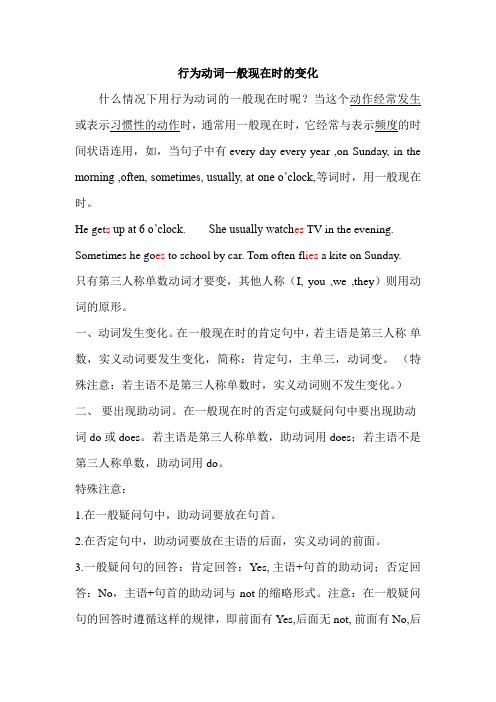
行为动词一般现在时的变化什么情况下用行为动词的一般现在时呢?当这个动作经常发生或表示习惯性的动作时,通常用一般现在时,它经常与表示频度的时间状语连用,如,当句子中有every day every year ,on Sunday, in the morning ,often, sometimes, usually, at one o’clock,等词时,用一般现在时。
He get s up at 6 o’clock. She usually watch es TV in the evening. Sometimes he go es to school by car. Tom often fl ies a kite on Sunday.只有第三人称单数动词才要变,其他人称(I, you ,we ,they)则用动词的原形。
一、动词发生变化。
在一般现在时的肯定句中,若主语是第三人称单数,实义动词要发生变化,简称:肯定句,主单三,动词变。
(特殊注意:若主语不是第三人称单数时,实义动词则不发生变化。
)二、要出现助动词。
在一般现在时的否定句或疑问句中要出现助动词do或does。
若主语是第三人称单数,助动词用does;若主语不是第三人称单数,助动词用do。
特殊注意:1.在一般疑问句中,助动词要放在句首。
2.在否定句中,助动词要放在主语的后面,实义动词的前面。
3.一般疑问句的回答:肯定回答:Yes, 主语+句首的助动词;否定回答:No,主语+句首的助动词与not 的缩略形式。
注意:在一般疑问句的回答时遵循这样的规律,即前面有Yes,后面无not, 前面有No,后面要有not。
这里所说的行为动词,指的是除be动词、情态动词和助动词之外的全部动词。
主语为第三人称单数he, she, it时,词形有变化。
当主语是第三人称单数时,行为动词的一般现在时通常有三种变化:1、多数在动词后加s play—play s like—like s ,read-read s sing-sing s2、以s,x,sh,ch,o结尾的动词加es go—go es wash--wash es, catch-catch es2、以辅音字母加y结尾,把y改i再加es fly—fl ies study—stud iestry-tr ies (这种变化与名词的单数变复数有点相像)写出下列动词的正确形式:1、I (go) to school at seven in the morning.2. Mike ( do) his homework at eight in the evening.3. His father often ( read) books in the library on Saturday.4. you often (study ) after school ?Yes , I do.5. Mike and Tom usually (fly ) kites on Sunday.6. She (go ) to school by bus every day.7.We usually (listen ) to the radio in the morning.8. he usually (listen ) to the music at home?No, he . 1.We often _(play) in the playground.9. What (do)—— he usually (do)—— after school?10. ______ they ________(like) the World Cup?11. ——Mike ——(read) English every day?12. How many lessons ---your classmate___(have) on Monday?13. What time _his mother -- (do) the housework?14. We _______(not watch) TV on Monday.15. Nick _______(not go) to the zoo on Sunday.写出下列动词的第三人称单数drink ______ go _____ stay _____ make ___look ____ have___ pass___ carry ____ come_______ watch_____ plant_______ fly ______study___ brush______改写句子1. Do you often play football after school? (肯定回答)2. I have many books. (改为否定句)3. Gao Shan’s sister likes playing table tennis (改为否定句4. She lives in a small town near New York.(改为一般疑问句)5. I watch TV every day. (改为一般疑问句)改错(划出错误的地方,将正确的写在横线上)1. Is your brother speak English? __________________2. Does he likes going fishing? __________________3. He likes play games after class. __________________4. Mr. Wu teachs us English. __________________5. She don’t do her homework on Sundays. ______________。
行为动词的一般现在时

行为动词的一般现在时一、行为动词指的是除be动词、情态动词和助动词之外的全部动词。
二、当句子使用一般现在时、主语为第三人称单数he,she,it时,作为谓语的行为动词需加“-s”。
三、什么情况下用行为动词的一般现在时呢?当这个动作经常发生或表示习惯性的动作时,通常用一般现在时,它经常与表示频度的时间状语连用。
例如:当句子中有every day,every year,on Sunday,in the morning,often,sometimes,usually等词时,我们通常用一般现在时。
例如:1. get up at six c 'clock every day.我每天早上6点起床。
2. He usually gets up at nine o'clock on Sundays.他周日通常9点起床。
3.She often smokes.她经常抽烟。
4. I phone my parents once a week.我每周给父母打一次电话。
四、行为动词的一般现在时还可以用来表达客观真理和科学事实。
例如1. Three and four makes seven.3加4等于7。
2. The earth moves around the sun.地球绕着太阳转。
3. Shenyang lies in the north of China.沈阳位于中国的北部。
五、行为动词一般现在时的常用句型:1.肯定句,主语+动词(注意人称变化)+…。
例如:1)I have a dog.我有一只狗。
2) We like that little cat.我们喜欢那只小猫。
3) She sings well.她歌唱得很好。
2.否定句,主语+助动词( (do/ does)+not+动词原形+…例如:1) He doesn't have a dog.他没有狗。
2) We don't like that little cat.我们不喜欢那只小猫。
小学六年级英语四种时态总结

小学六年级英语四种时态总结一、一般现在时标志词:always(总是) usually(通常) often(经常) sometimes(有时) never(从不) every(每一)行为动词词型变化形式行为动词词型变化形式一般现在时动词一般现在时动词只有第三人称只有第三人称有词形变化,有词形变化, 其他人称(第一人称:I, we ;第二人称:you ;第三人称复数:they 、my friends )动词均用原形)动词均用原形 当主语是第三人称单数时,一般动词在一般现在时句子中的变化规律: 1、多数在动词后加s play —plays like like——likes , 2、以s ,x ,sh ,ch ,o 结尾的动词加es wash –washes catch –catches do –does 3、以辅音字母加y 结尾,把y 改i 再加es fly fly——flies study —studies 4、以元音字母加y 结尾,直接加s buy buy –– buys 5、不规则变化、不规则变化 have —has 一般现在时一般现在时基本用法基本用法 功能功能1.表示事物或人物的特征、状态。
表示事物或人物的特征、状态。
如:The sky is blue.天空是蓝色的。
天空是蓝色的。
2.表示经常性或习惯性的动作。
表示经常性或习惯性的动作。
如:I get up at six every day.我每天六点起床。
我每天六点起床。
3.表示客观现实。
表示客观现实。
如:The earth goes around the sun.地球绕着太阳转。
地球绕着太阳转。
The earth is round. 构成构成1. be 动词:主语+be(am,is,are)+其它。
如:I am a boy.我是一个男孩。
我是一个男孩。
2.行为动词:主语+行为动词(+其它)。
如:We study English.我们学习英语。
(完整版)七年级一般现在时

第一家族:含be动词或情态动词 的一般疑问句
1、Is this your English book ?
be 主语
其他
Yes,it is.
No,it isn’t.
be + 主语 + 其它部分?
否定句的构成
主语 + 情态动词 + not + 动词原形 + 其他
can not = can’t could not = couldn’t must not = mustn’t would not = wouldn’t will not = won’t should not = shouldn’t may not = may not
•
太阳从东方升起。
你记住了么?
一般现在时的构成
一、系动词be的一般现在时 二、情态动词的一般现在时 三、实义(行为)动词的一
般现在时
• 一、系动词be的一般现在时
1、构成: 主语 + be 系动词+ 表语(名词/形容词/介词短语)
The girl is my friend. He is Chinese. We are in Zhangzhou now.
2、be 包 括 哪 些 ?
is am are
• 主语为三单数时――→is • 主语为复数时――→ are • 主语为“I”时 ――→am
Exercise
• 1、Kitty is an English girl. • 2、We are students. • 3、I am from Taizhou. • 4、She is tall. • 5、Lucy and Lily are good friends. • 6、Those chairs are broken. • 7、The bag is mine.
中考英语语法行为动词的一般现在时复习讲义及用法总结

中考英语语法行为动词的一般现在时复习讲义及用法总结行为动词的一般现在时除了be动词(am,is,are)、助动词、情态动词以外的动词全部称为行为动词。
在行为动词的句型中,主语为第三人称单数时的动词变化要特别注意(构成参见(第9章动词概说))。
行为动词一般现在时的否定句和一般疑问句要加do/does,这和be动词是不同的。
1.行为动词一般现在时的肯定句I play baseball every Sunday.(我每个星期日都打棒球。
)She usually does her homework at school.(她通常在学校做作业。
)(1)主语为第一、二人称或第三人称复数时主语为第一人称I/we、第二人称you或第三人称复数时,谓语动词没有形式的变化。
句型:主语(除第三人称单数外)+行为动词(原形)+……I go to school every day.(我每天去上学。
)We have three children.(我们有三个孩子。
)You sing very well.(你(们)唱得很棒。
)They live far from school.(他们住得离学校远。
)(2)主语为第三人称单数时主语为第三人称单数时,谓语动词的一般现在时形式有变化,变化规律和名词的单数变复数形式相同。
句型:主语(第三人称单数)+行为动词(-s/-es)+……He always wears (in) black.(他总是穿黑色的衣服。
)She often gets up at half past six.(她经常六点半起床。
)Who(主语)looks after(谓语)the baby?(谁照看这个婴儿?)(2)特殊疑问句的回答特殊疑问句不能用yes/no回答。
由于在问句中出现do/does,所以动词保持原形,但回答时,动词要视主语而决定是否加-s等。
A:Where does her father work?(她父亲在哪儿工作?)B:He works in an iron factory.(他在一家铁制品厂工作。
小学英语时态总结
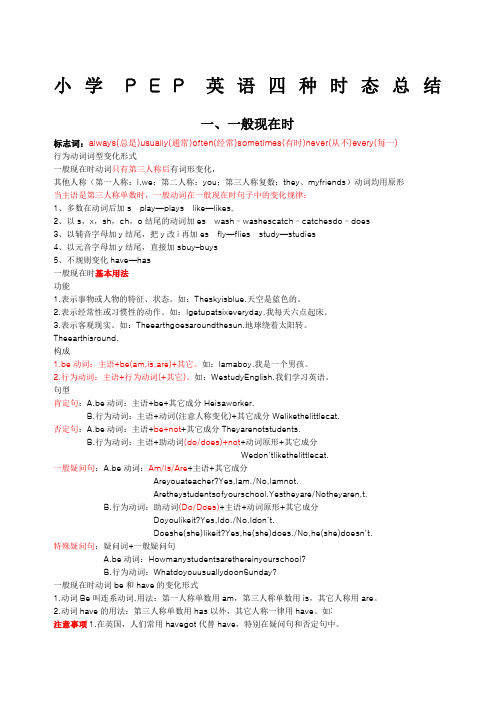
小学P E P英语四种时态总结一、一般现在时标志词:always(总是)usually(通常)often(经常)sometimes(有时)never(从不)every(每一)行为动词词型变化形式一般现在时动词只有第三人称后有词形变化,其他人称(第一人称:I,we;第二人称:you;第三人称复数:they、myfriends)动词均用原形当主语是第三人称单数时,一般动词在一般现在时句子中的变化规律:1、多数在动词后加s play—plays like—likes,2、以s,x,sh,ch,o结尾的动词加es wash–washescatch–catchesdo–does3、以辅音字母加y结尾,把y改i再加es fly—flies study—studies4、以元音字母加y结尾,直接加sbuy–buys5、不规则变化have—has一般现在时基本用法功能1.表示事物或人物的特征、状态。
如:Theskyisblue.天空是蓝色的。
2.表示经常性或习惯性的动作。
如:Igetupatsixeveryday.我每天六点起床。
3.表示客观现实。
如:Theearthgoesaroundthesun.地球绕着太阳转。
Theearthisround.构成1.be动词:主语+be(am,is,are)+其它。
如:Iamaboy.我是一个男孩。
2.行为动词:主语+行为动词(+其它)。
如:WestudyEnglish.我们学习英语。
句型肯定句:A.be动词:主语+be+其它成分Heisaworker.B.行为动词:主语+动词(注意人称变化)+其它成分Welikethelittlecat.否定句:A.be动词:主语+be+not+其它成分Theyarenotstudents.B.行为动词:主语+助动词(do/does)+not+动词原形+其它成分Wedon’tlikethelittlecat.一般疑问句:A.be动词:Am/Is/Are+主语+其它成分Areyouateacher?Yes,Iam./No,Iamnot.Aretheystudentsofyourschool.Yestheyare/Notheyaren,t.B.行为动词:助动词(Do/Does)+主语+动词原形+其它成分Doyoulikeit?Yes,Ido./No.Idon’t.Doeshe(she)likeit?Yes,he(she)does./No,he(she)doesn’t.特殊疑问句:疑问词+一般疑问句A.be动词:Howmanystudentsarethereinyourschool?B.行为动词:WhatdoyouusuallydoonSunday?一般现在时动词be和have的变化形式1.动词Be叫连系动词,用法:第一人称单数用am,第三人称单数用is,其它人称用are。
Unit2 行为动词的一般现在时 七上单元语法知识点与题型精练 含解析(新牛津译林版)
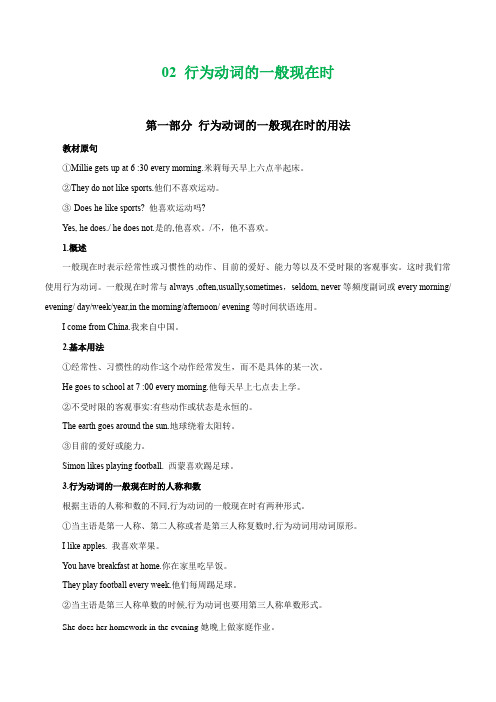
02 行为动词的一般现在时第一部分行为动词的一般现在时的用法教材原句①Millie gets up at 6 :30 every morning.米莉每天早上六点半起床。
②They do not like sports.他们不喜欢运动。
③-Does he like sports? 他喜欢运动吗?Yes, he does./ he does not.是的,他喜欢。
/不,他不喜欢。
1.概述一般现在时表示经常性或习惯性的动作、目前的爱好、能力等以及不受时限的客观事实。
这时我们常使用行为动词。
一般现在时常与always ,often,usually,sometimes,seldom, never等频度副词或every morning/ evening/ day/week/year,in the morning/afternoon/ evening等时间状语连用。
I come from China.我来自中国。
2.基本用法①经常性、习惯性的动作:这个动作经常发生,而不是具体的某一次。
He goes to school at 7 :00 every morning.他每天早上七点去上学。
②不受时限的客观事实:有些动作或状态是永恒的。
The earth goes around the sun.地球绕着太阳转。
③目前的爱好或能力。
Simon likes playing football. 西蒙喜欢踢足球。
3.行为动词的一般现在时的人称和数根据主语的人称和数的不同,行为动词的一般现在时有两种形式。
①当主语是第一人称、第二人称或者是第三人称复数时,行为动词用动词原形。
I like apples. 我喜欢苹果。
You have breakfast at home.你在家里吃早饭。
They play football every week.他们每周踢足球。
②当主语是第三人称单数的时候,行为动词也要用第三人称单数形式。
She does her homework in the evening她晚上做家庭作业。
初中英语八种时态归纳复习
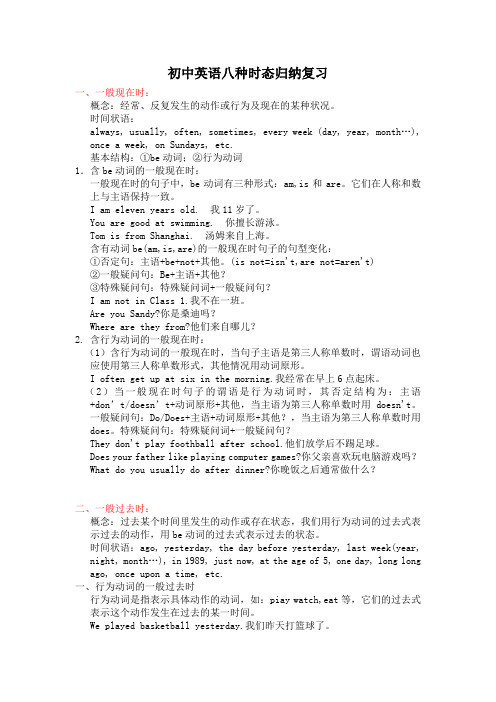
初中英语八种时态归纳复习一、一般现在时:概念:经常、反复发生的动作或行为及现在的某种状况。
时间状语:always, usually, often, sometimes, every week (day, year, month…), once a week, on Sundays, etc.基本结构:①be动词;②行为动词1.含be动词的一般现在时:一般现在时的句子中,be动词有三种形式:am,is和are。
它们在人称和数上与主语保持一致。
I am eleven years old. 我11岁了。
You are good at swimming. 你擅长游泳。
Tom is from Shanghai. 汤姆来自上海。
含有动词be(am,is,are)的一般现在时句子的句型变化:①否定句:主语+be+not+其他。
(is not=isn't,are not=aren't)②一般疑问句:Be+主语+其他?③特殊疑问句:特殊疑问词+一般疑问句?I am not in Class 1.我不在一班。
Are you Sandy?你是桑迪吗?Where are they from?他们来自哪儿?2. 含行为动词的一般现在时:(1)含行为动词的一般现在时,当句子主语是第三人称单数时,谓语动词也应使用第三人称单数形式,其他情况用动词原形。
I often get up at six in the morning.我经常在早上6点起床。
(2)当一般现在时句子的谓语是行为动词时,其否定结构为:主语+d on’t/doesn’t+动词原形+其他,当主语为第三人称单数时用doesn't。
一般疑问句:Do/Does+主语+动词原形+其他?,当主语为第三人称单数时用does。
特殊疑问句:特殊疑问词+一般疑问句?They don't play foothball after school.他们放学后不踢足球。
行为动词的一般现在时

使用一般现在时可以表示与目前情况相反的情况,例如 “If only I were a rich man!”(我要是富翁就好了!)
与未来事实相反
使用一般现在时可以表示对未来的假设或期望,例如“If only I could fly!”(我要是能飞就好了!)
06
行为动词的一般现在时与过去时的 比较
在句尾添加问号(?)
在一般现在时的疑问句中,需要 在句尾添加问号(?)来表示疑
问语气。
问号的位置是在句子的最后一个 单词后面,而不是在句末逗号后
面。
例如:“He plays the guitar.” 变为疑问句为:“He plays the
guitar?”(他弹吉他吗?)
使用倒装句式
在一般现在时的疑问 句中,还可以使用倒 装句式来强调主语或 行为动词。
行为动词的一般现在时的疑问句形 式
将助动词do/does/did提前到句首
助动词do/does/did用于一般现在时的疑问 句中,表示询问对方是否执行某个行为。
助动词do/does/did放在句首,后面紧跟主 语和行为动词。
例如:“Do you play the guitar?”(你弹吉 他吗?)
03
行为动词的一般现在时的否定形式
在动词前加助动词do/does(第三人称单数)
总结词
在一般现在时中,当主语是第三人称单数时,否定形式在动词前加助动词 "does",其余人称在动词前加助动词"do"。
详细描述
例如,"He doesn't like apples."(他不喜欢苹果)和"They don't go to school on Sundays."(他们周日不去上学)中的"doesn't"和"don't"即为否定 形式的助动词。
行为动词一般现在时的变化

行为动词一般现在时的变化珠村小学邓惠芳这里所说的行为动词,指的是除be动词、情态动词和助动词之外的全部动词。
行为动词为数众多,主语为第三人称单数he, she, it时,词形有变化。
当主语是第三人称单数时,行为动词的一般现在时通常有三种变化:1、多数在动词后加s play—play s like—like s ,read-read ssing-sing s dance-dance s cook- cook s look- look s2、以s,x,sh,ch,o结尾的动词加es go—go es wash--wash es,watch-watch es catch-catch es do- do es3、以辅音字母加y结尾,把y改i再加es fly—fl iesstudy—stud ies try-tr ies(这种变化与名词的单数变复数有点相像)那么,什么情况下用行为动词的一般现在时呢?当这个动作经常发生或表示习惯性的动作时,通常用一般现在时,它经常与表示频度的时间状语连用,如,当句子中有every day every year ,on Sunday, in the morning ,often, sometimes, usually, at one o’clock,等词时,用一般现在时。
He get s up at 6 o’clock. She usually watch es TV in the evening. Sometimes he go es to school by car. Tom often fl ies a kite on Sunday.只有第三人称单数动词才要变,其他人称(I, you ,we ,they)则用动词的原形。
行为动词的一般现在时练习题班级姓名座号写出下列动词的正确形式:1、I (go) to school at seven in the morning.2. Mike ( do) his homework at eight in the evening.3. His father often ( read) books in the library on Saturday.4.My mother usually (watch) TV plays at home.5. My cousin sometimes (play ) cards with me.6. you often (study ) after school ?Yes ,I do.7. Mike and Tom usually (fly ) kites on Sunday.8. They (go) to school by bus every day.9. She (go ) to school by bus every day.10.We usually (listen ) to the radio in the morning.11. He usually (listen ) to the radio in the morning.12. he usually (listen ) to the music at home?No, he .。
一般现在时
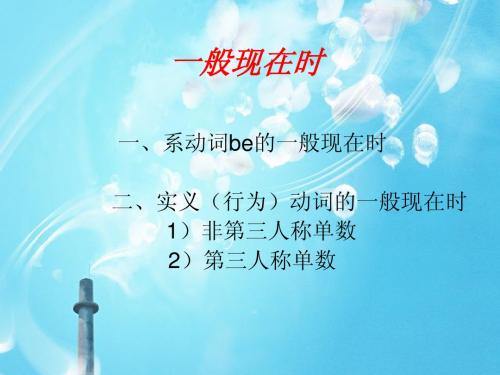
第三人称单数否定句的构成
结构:主语 + 助动词does)+not +行为动词原形 + 其他
1.Tom studies English every day. Tom doesn't study English every day 2. She likes to go shopping.
3. Lily has a nice dog.
含be动词一般现在时一般疑问句 be + 主语 + 其它部分?
肯定回答:Yes,主语+be 否定回答:No,主语+be+not 1. She is a beautiful girl. Is she a beautiful girl? Yes,she is./No,she isn't. 2. His father is a teacher.
•
Practice
• • • • • 1、Kitty (be,not) an English girl. 2、We (be,not) students. 3、I (be,not) from Taizhou. 4、She (be, not) tall. 5、Lucy and Lily (be,not)good friends. • 6、Those chairs (not) broken. • 7、The bag (not) mine.
例:We don’t (not do) our homework in the afternoon.
答案:don’t do 解析:do是一个比较难理解的词,它有三个含义: a)是所有行为动词的总称;b) 是助动词,无实义;c)是一个具体的行为动词“做,干”。此句中给出的do指 “做,干”,not指把此句变为否定句,故须在do前加助动词don’t。
- 1、下载文档前请自行甄别文档内容的完整性,平台不提供额外的编辑、内容补充、找答案等附加服务。
- 2、"仅部分预览"的文档,不可在线预览部分如存在完整性等问题,可反馈申请退款(可完整预览的文档不适用该条件!)。
- 3、如文档侵犯您的权益,请联系客服反馈,我们会尽快为您处理(人工客服工作时间:9:00-18:30)。
一. 当我们谈论以下几种情况时,用一 般现在时:
1. 表示现在存在的状态; 2. 表示经常性、习惯性的动作; 3. 表示客观事实或普遍真理。 句中常用always, usually, often,
sometimes, seldom, never, every day,in the morning等 时间状语。
7
写出下列行为动词的第三人称单数形式:
1.like--- likes 2.swim— swims 3.work— works 4.catch— catches 5.go---- goes 6.study— studies 7.worry— worries 8.have--- has 9.do--- does
+s
walk walks
live
lives
Verbs ending in a consonant +y
Verbs ending in ss, ch, sh x, or o
-y + ies + es
fly flies study studies miss misses watch watches finish finishes Fix fixes do does go goes
用所给词的适当形式填空 1. I ____g_o__(go) swimming on Sunday.
2. My cousin_e__n_jo_y_s_(enjoy) computer
games.
3. My parents___w_a_t_c_h___(watch) TV. 4. Tom and Simon __li_k_e___(like) fish. 5. He ___s_w__im__s___(swim)every day. 6.Tom__p_la_y_s__(play) football every day.
7. I often _p_l_a_y_ football at weekends. (play) 8. Simon’s father oftenw_a__tc_h__efsootball games on TV.
(watch)
9. Millie _r_e_a_d_s_ books at home. (read)
当主语是第一、第二人称和第三人称复数时,行为动 词使用其原形。当主语是第三人称单数时,行为动词 使用其第三人称单数形式。
行为动词一般现在时的第三人称单数形式的构成方法 见书117页。 主语是第三人称单数指的是:(举例说明)
How to add “s” “es” to the verbs
Most verbs
—things that are true now.目前存在的事实
Simon plays football after school.
—things that we do regularly. 经常做的事
Cats eat fish.
—things that are always true.客观存在的事实
Grammar
一般现在时
(Simple Present Tense )
--行为动词的一般现在时
语法要点: 一般现在时
1. 肯定句 2. 否定句 3. 一般疑问句及肯定与否定回答 4. 特殊疑问句 注意: 第三人称单数的用法。
(一般现在时用法)
I have long hair. My hair is long.
put_p_u_t_s enjoy_e_n_jo__y_s write_w_r_it_e_s match_m_a_t_c_h_es play_p_la_y_s_ have_h_a_s guess_g_u_e_s_s_e_s__ fly_fl_ie_s__ go_g_o_e_s_ listen_li_s_t_e_n_s buy_b_u_y_s_ finish_f_in_i_s_h_e_s_ do_d_o_e_s_ worry_w_o_r_r_ie_s_ washw__a_s_h_e_sstay_s_ta_y_s
10. Kitty’s parents often __g_o___ shopping on
Saturdays. (go)
11. Amy with her father _g_o__e_s_ swimming on
weekends. (go)
12. Sandys_t_u_d_i_e_sEnglish in her free time. (study) 13. Amy and Simon _w__a_n_t_ to play football in the next
World Cup. (want)
14. We __li_k_e__ listening to music. (like)
行为动词一般现在时的否定句和一般疑问句。
1、I speak English. 否定句:I do not /don’t speak English. 一般疑问句:Do you speak English? 肯定回答:Yes, I do. 否定回答:No, I don’t. 2、He speaks English. 否定句:He does not /doesn’t speak English 一般疑问句:Does he speak English? 肯定回答:Yes, he does. 否定回答:No, he doesn’t. (注意蓝色和红色字体,总结规律。
一般现在时的构成:
My name is Amy. He is ten years old.
---be动词的一般现在时。 I often play football after school.
He watches TV every day. 类
行为动词的一般现在时的构成:(看例句并总结规律, 注意观察红色和蓝色字体。) 1、I play football every day . 2、You play football every day . 3、My friends play football every day . 4、He plays football every day . 5、Tom plays football every day . 6、My brother plays football every day . 总结规律:
